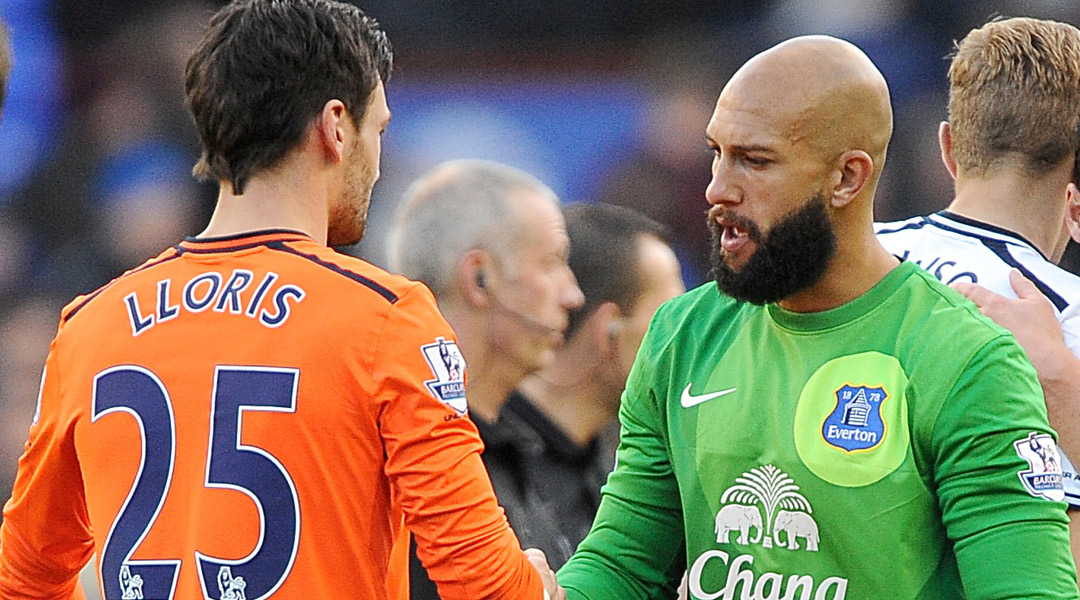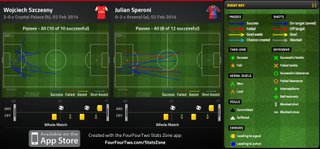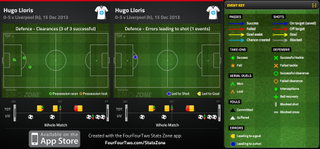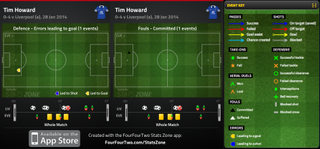Why Lloris and Howard typify Tottenham and Everton's style - and potential disaster
Michael Cox dissects the unorthodox tactical battle which could influence the top-four tussle...

When considering the tactical battle between two upcoming opponents, it’s extremely rare to pinpoint goalkeeping style as a major factor. Ahead of Tottenham and Everton’s meeting at White Hart Lane on Sunday afternoon, however, this could be a crucial area of the game.
The tactical approach of goalkeepers has become particularly important in recent years, perhaps because of an increased emphasis upon strategy as a whole, but also because of the increased emphasis on universality. Attackers are now expected to defend, defenders must attack, and even goalkeepers aren’t immune from their job description becoming more all-encompassing.
There’s a greater focus on the distribution of goalkeepers – indeed, a neat way to summarise a side’s playing style is to look at their goalkeeper’s pass completion statistics. Possession-based sides start moves from the back; more direct teams instruct their goalkeeper to lob the ball towards the centre-forward immediately. The contrast was particularly obvious between Arsenal and Crystal Palace last weekend, for example.

Goalkeepers have become the eleventh outfield player. Few take this concept as literally as Tottenham’s Hugo Lloris, who is more sweeper than keeper. His continual forward charges were useful under Andre Villas-Boas, who demanded midfield pressure and a high defensive line – and with Spurs’ centre-backs not the most comfortable on the turn, Lloris was always ready to clear the danger.
However, in recent months the Frenchman has seemed rather too keen to stray from his line. Playing such a proactive role means a goalkeeper’s decision-making is given a severe test – and Lloris has been getting too many decisions wrong. In the 5-0 thrashing against Liverpool, Villas-Boas’ final game in charge, he kept making clearances on the edge of his box – and an error was inevitable.
Get FourFourTwo Newsletter
The best features, fun and footballing quizzes, straight to your inbox every week.

It’s also questionable whether his style works as effectively in conjunction with Tim Sherwood’s approach. Now, the defence drops much deeper, and rather than leaving space in behind, Spurs are conceding space between the lines because Sherwood doesn’t favour defensive midfielders. Lloris seems to sweep when unnecessary, and comes for balls his defenders could clear.
Meanwhile on Merseyside
If Lloris is a modern goalkeeper in a side that demands a traditional one, Tim Howard is the reverse. Having become accustomed to playing reactively under David Moyes, he has been forced to become more proactive by the shift to Roberto Martinez’s playing style. Interestingly, Howard has recently praised Lloris for his style of goalkeeping, highlighting the Frenchman as an inspiration to his contemporaries.
Howard’s new approach hasn’t always been successful, however. American goalkeepers have a reputation for being poor at the ‘outfield’ side of things – supposedly, they’re excellent shot-stoppers, but not great with their feet, or at darting off their line.
Even if the stereotype is untrue, Howard is supporting the theory. His performance in the recent 4-0 Merseyside derby defeat was extremely poor, especially when advancing forward. He seemed to advance into too wide a position for Liverpool’s first goal, and there was no need for him to dash forward to charge down Daniel Sturridge for Liverpool’s second – it gave the England striker the easy option to lob the ball over him.
Amazingly, Howard did something similar at the start of the second half, charging forward and mistiming a challenge on Raheem Sterling. You could practically witness Sterling’s thought process – realising Howard was approaching, anticipating the challenge and blatantly playing for a penalty.

Howard has the right idea, he’s simply made poor decisions recently. In other matches he’s been impressive when sweeping, such as in the 1-1 draw at Arsenal before Christmas – when the Gunners’ through-balls forced him forward off his line to make excellent saves three times in quick succession. Again, however, when playing this role, goalkeepers must get these decisions correct at least 90% of the time, or else they become a liability.
Last time these two goalkeepers met, both kept clean sheets – but we were talking about Lloris for the wrong reasons, after he continued playing despite appearing concussed. On Sunday, goalkeepers might be the focus once again.
